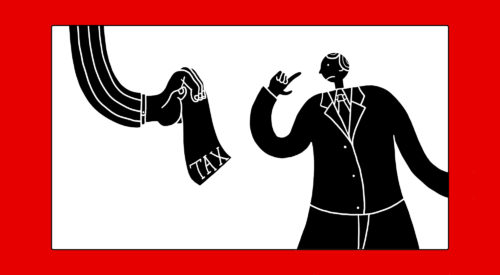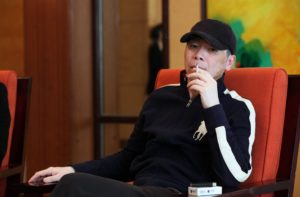Actress Zheng Shuang, confirmed deadbeat mother, under investigation for tax evasion
Trouble is afoot once again for Chinese actress Zhèng Shuǎng 郑爽, who has largely kept out of the public eye since January amid controversy over her surrogacy. This time, she is the subject of an investigation by tax authorities.

Trouble is afoot once again for Chinese actress Zhèng Shuǎng 郑爽, who has largely kept out of the public eye since January amid controversy over children she had via surrogacy, but later appeared to reject. This time, she is the subject of an investigation by tax authorities, who have accused the high-profile star of evading millions of dollars in taxes. The taxman has vowed to increase scrutiny of tax fraud in the country’s entertainment industry, and seems to have chosen her as an example pour encourager les autres.
The suspicion of Zheng’s tax avoidance surfaced earlier this week when her estranged partner, Zhāng Héng 张恒, dropped a bombshell on Weibo by sharing screenshots of alleged chats between him, Zheng, and her parents, in which they discussed the actress’s payment for starring in the drama series A Chinese Ghost Story.
The show hasn’t aired yet, as all scenes featuring Zheng needed to be digitally removed following her surrogacy scandal, according to its production company. But her husband, Zhang, revealed that based on their deal, the 29-year-old actress still received a salary of 160 million yuan ($24.7 million) after spending 77 days on the set, just over $320,000 per day.
To maximize her earnings, Zheng and her parents allegedly created a dual contract, or “yin-yang contract” (阴阳合同), with the production company — where one performance fee is reported to tax authorities while a much higher one is paid in secret. This practice is common in China’s entertainment industry, but has been the subject of government scrutiny since megastar Fàn Bīngbīng 范冰冰 was punished for using such contracts in 2018. She was also criticized for the excessive size of her paychecks.
Ex-husband says Zheng also abandoned unwanted puppy
Zhang also revealed that his ex-wife’s lawyers had been making claims of him “abetting Zheng’s tax evasion,” but he declared that he was innocent. “As a law-abiding citizen, all I can do is try my best to fulfill my duties of reporting suspicious activities to the authorities,” Zhang wrote (in Chinese) in a Weibo post, where he also accused Zheng of shoplifting, fabricating receipts for reimbursement, and abandoning her sick pet dog to avoid medical costs.
Since January, Zhang and Zheng have waged a bitter war in both the court and the press over Zhang’s revelation that the now-split couple had two babies born to surrogate mothers in the U.S., but she had abandoned them with him in the U.S. and refused to complete paperwork regarding the two kids’ birth to obtain passports for them to visit China. The pair’s public feud also involved a lawsuit over 20 million yuan ($3.09 million), which the actress claimed that Zhang had borrowed from her but never paid back.
While Zheng insisted that she never broke any laws, the surrogacy scandal has made her a target of public outrage and largely ruined her career. Now the allegations about her high pay and tax avoidance have renewed indignation from internet users and heightened scrutiny from officials.
On social media, the tax evasion accusations further tarnished Zheng’s already-damaged reputation, with a large number of commenters using the actress as an outlet to vent their frustration over income inequality. Many gathered under the hashtag “What does 160 million yuan look like” (1.6亿是什么概念), which has been viewed about 220 million times on Weibo, to share their sense of unfairness and resentment. “With a monthly salary of 5,000 yuan ($770), I might eventually have that amount of money — if I wait over 2,666 years,” one person wrote (in Chinese).
Others slammed the entertainment industry for throwing too much money at Zheng, who has been criticized for weak acting performances and an attitude problem. “I just want her to do the bare minimum as an actress. I don’t think I’m asking too much,” another Weibo user wrote (in Chinese).
The controversy has also caught the attention of tax authorities. China Central Television, the Chinese state broadcaster, reported (in Chinese) yesterday that the Shanghai Municipal Tax Service had launched an investigation into Zheng’s finances. Meanwhile, Beijing Municipal Radio and Television Bureau announced that it would probe a wide range of dubious practices in the entertainment industry, including tax avoidance and the ultra-high salaries of actors.
Following the Fan Bingbing scandal, the Chinese government implemented a salary cap on TV actors: 1 million yuan ($154,511) per episode and 50 million yuan ($7.72 million) per season, no matter how many episodes of a show they star in.
In theory, the rules seem straightforward and easy to apply. However, in practice, Chinese actors still manage to use “yin-yang contracts” to evade taxes and salary caps, mainly through splitting their earnings into two parts, one counted as their individual incomes and the other counted as financial gains by companies they own. As in the U.S., companies can often pay lower taxes on revenue than individuals. But in the wake of Zheng’s tax scandal, this maneuver is likely to face resistance from officials, and the fear of legal consequences has just in the last few days already prompted a host of Chinese celebrities — including A-listers like Dèng Chāo 邓超 and Wén Zhāng 文章 — to dissolve companies (in Chinese) registered under their names.




